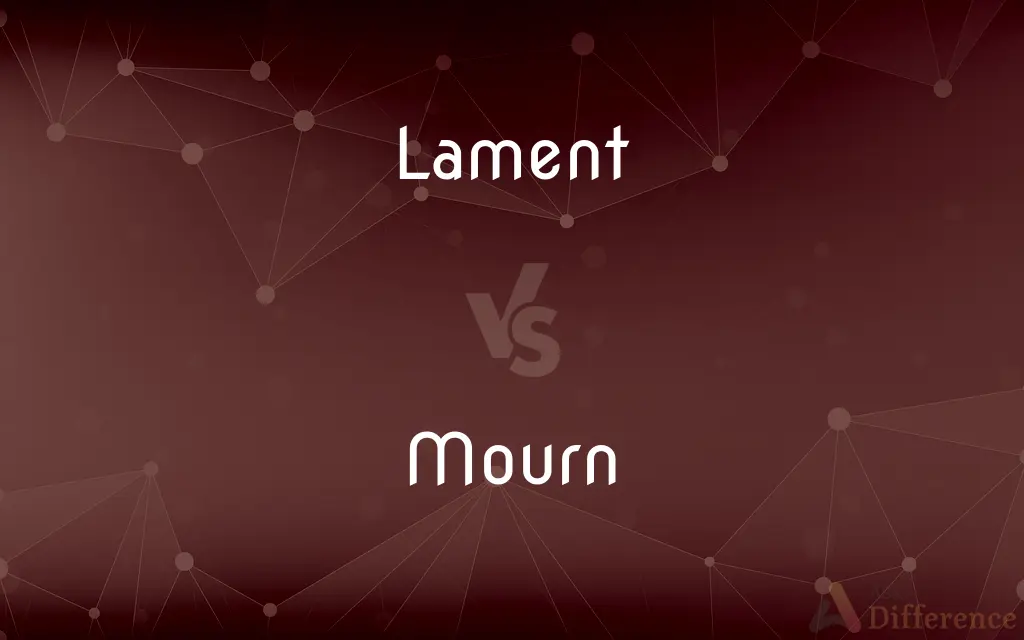Lament vs. Mourn — What's the Difference?
By Maham Liaqat & Fiza Rafique — Updated on March 21, 2024
Lament refers to expressing sorrow, regret, or unhappiness about something, often vocally or through written expression, while mourn involves the process of grieving or showing deep sorrow, especially for someone's death.

Difference Between Lament and Mourn
Table of Contents
ADVERTISEMENT
Key Differences
Lamentation often involves a vocal or expressive element, such as crying out, wailing, or making a lament through poetry or song, focusing on the articulation of grief, regret, or disappointment. Mourning, however, encompasses a broader range of grieving behaviors and practices, including personal and communal acts of sorrow, remembrance, and rituals associated with death.
While lament can be used in contexts of loss, failure, or dissatisfaction, extending beyond personal grief to include expressions of societal or collective sorrow, mourning is typically associated with the emotional process following the loss of a loved one, involving stages of grief that can lead to eventual acceptance and healing.
The act of lamenting can be a part of the mourning process, serving as an outlet for the intense emotions that come with grief. Conversely, mourning encompasses not only the emotional responses to loss but also the cultural, religious, or personal rituals and practices that help individuals and communities process and cope with death.
Lamentation can sometimes have a cathartic effect, allowing the expression of pain to lead to some relief or understanding, whereas mourning is a more extended process that might involve various emotions, from profound sadness and anger to eventual reconciliation with the loss.
Understanding the nuances between lamenting and mourning is important in contexts of literature, music, psychology, and cultural studies, as both concepts play significant roles in human expressions of grief and coping with loss.
ADVERTISEMENT
Comparison Chart
Definition
Expressing sorrow, regret, or unhappiness about something.
Grieving or showing deep sorrow, especially for someone's death.
Expression
Often vocal or through written forms like poetry or song.
Involves emotional processes and may include rituals or practices.
Context
Can be personal or collective, not limited to death.
Typically associated with the grieving process after death.
Purpose
Articulates grief, dissatisfaction, or regret.
Facilitates coping with and processing of loss.
Scope
Focused on the act of expressing sorrow.
Encompasses emotional response and cultural practices of grieving.
Compare with Definitions
Lament
An expression of grief or sorrow.
The poet's latest work is a lament for the destruction of the environment.
Mourn
To grieve deeply, often for someone who has died.
She continues to mourn her grandmother years after her passing.
Lament
Can be a personal or public expression of regret or disappointment.
The community's lament over the closed factory was palpable.
Mourn
Involves navigating through stages of grief.
In her mourning, she found comfort in cherished memories.
Lament
Often expressed through literature, music, or art.
The haunting melody was a lament for lost love.
Mourn
May involve rituals or customs specific to a culture.
The family wore black to mourn their loss, following tradition.
Lament
Lamentations can be part of cultural or religious rituals.
The ancient rituals included laments to honor the gods.
Mourn
A deeply personal journey of coming to terms with loss.
The community came together to mourn the tragedy collectively.
Lament
Can have a cathartic impact, providing relief through expression.
Writing a lament for his lost friend helped him process his feelings.
Mourn
Centered on personal and emotional responses to bereavement.
He found it hard to express the depth of his mourning.
Lament
A lament or lamentation is a passionate expression of grief, often in music, poetry, or song form. The grief is most often born of regret, or mourning.
Mourn
To feel or express grief or sorrow.
Lament
To express grief for or about; mourn
Lament a death.
Mourn
To show grief for a death by conventional signs, as by wearing black clothes.
Lament
To regret deeply; deplore
He lamented his thoughtless acts.
Mourn
To make a low, indistinct, mournful sound. Used especially of a dove.
Lament
To grieve audibly; wail.
Mourn
To feel or express deep regret for
Mourned the wasted years.
Lament
To express sorrow or regret.
Mourn
To grieve over (someone who has died).
Lament
A feeling or expression of grief; a lamentation.
Mourn
To utter sorrowfully.
Lament
A song or poem expressing deep grief or mourning.
Mourn
(ambitransitive) To express sadness or sorrow for; to grieve over (especially a death).
Lament
An expression of grief, suffering, sadness or regret.
Mourn
(transitive) To utter in a sorrowful manner.
Lament
A song expressing grief.
Mourn
(intransitive) To wear mourning.
Lament
(intransitive) To express grief; to weep or wail; to mourn.
Mourn
Sorrow, grief.
Lament
(transitive) To feel great sorrow or regret; to bewail.
Mourn
A ring fitted upon the head of a lance to prevent wounding an adversary in tilting.
Lament
To express or feel sorrow; to weep or wail; to mourn.
Jeremiah lamented for Josiah.
Ye shall weep and lament, but the world shall rejoice.
Mourn
To express or to feel grief or sorrow; to grieve; to be sorrowful; to lament; to be in a state of grief or sadness.
Abraham came to mourn for Sarah, and to weep for her.
Lament
To mourn for; to bemoan; to bewail.
One laughed at follies, one lamented crimes.
Mourn
To grieve for; to lament; to deplore; to bemoan; to bewail.
As if he mourned his rival's ill success.
And looking over the hills, I mournThe darling who shall not return.
Lament
Grief or sorrow expressed in complaints or cries; lamentation; a wailing; a moaning; a weeping.
Torment, and loud lament, and furious rage.
Mourn
To utter in a mournful manner or voice.
The lovelorn nightingaleNightly to thee her sad song mourneth well.
Lament
An elegy or mournful ballad, or the like.
Mourn
Feel sadness;
She is mourning her dead child
Lament
A cry of sorrow and grief;
Their pitiful laments could be heard throughout the ward
Mourn
Observe the customs of mourning after the death of a loved one
Lament
A song or hymn of mourning composed or performed as a memorial to a dead person
Lament
A mournful poem; a lament for the dead
Lament
Express grief verbally;
We lamented the death of the child
Lament
Regret strongly;
I deplore this hostile action
We lamented the loss of benefits
Common Curiosities
Is it possible to lament something without feeling grief?
Lamenting typically involves a sense of grief or sorrow, but it can also include feelings of regret or disappointment without the profound depth associated with mourning.
How can expressing lament help in the grieving process?
Expressing lament can provide emotional release, help individuals process their feelings, and foster a sense of shared experience and support when expressed in a communal setting.
Can lamenting be part of mourning?
Yes, lamenting can be a part of mourning, especially as an expressive element of the grieving process.
How do children express lament and mourning?
Children may express lament and mourning differently from adults, often through behavioral changes, artwork, or play, as they may lack the verbal skills to articulate complex emotions.
What role does music play in the processes of lamenting and mourning?
Music can play a significant role, serving as a powerful medium for expressing sorrow, facilitating mourning, and providing comfort to those grieving, often transcending cultural and linguistic barriers.
Is lamenting always a verbal expression?
Lamenting can be both verbal and non-verbal. It encompasses a range of expressions including poetry, music, and other forms of artistic expression, not just spoken or written words.
Can someone mourn the loss of an idea or dream?
Yes, individuals can mourn the loss of non-tangible entities like dreams, ideals, or the end of a significant life phase, experiencing genuine grief over these intangible losses.
Is it healthy to suppress feelings of lament or mourning?
Suppressing feelings of lament or mourning is generally not considered healthy as it can lead to unresolved grief. Expressing these emotions is crucial for emotional processing and healing.
How do different religions approach mourning?
Different religions have unique mourning rituals and beliefs about death and grief. These can range from specific mourning periods to rituals aimed at honoring the deceased and comforting the living.
Can a community mourn a non-death event?
While mourning is usually associated with death, communities can engage in mourning-like practices in response to significant losses or tragedies that don't involve death, such as the loss of a way of life or a significant community landmark.
How do cultural practices influence mourning?
Cultural practices can dictate the rituals, duration, and public expressions of mourning, reflecting shared beliefs about honoring the deceased and supporting the bereaved.
Can lamenting be a collective experience?
Yes, lamenting can be a collective experience, often observed in communal gatherings, public memorials, or through shared artistic expressions, reflecting a communal sense of loss or regret.
Can the process of mourning change over time?
Yes, the mourning process can evolve, with the intensity of grief often diminishing over time, though significant dates or reminders can renew feelings of sadness.
Is it possible to mourn the loss of a pet as intensely as the loss of a human?
Yes, many people experience intense grief over the loss of a pet, similar to the mourning felt for a human, reflecting the deep emotional bonds formed with pets.
How do public figures influence collective mourning?
The death of public figures can lead to widespread public mourning, with their life and work often taking on new meaning and inspiring collective expressions of grief and homage.
Share Your Discovery

Previous Comparison
Timeline vs. Timesheet
Next Comparison
Butler vs. CookAuthor Spotlight
Written by
Maham LiaqatCo-written by
Fiza RafiqueFiza Rafique is a skilled content writer at AskDifference.com, where she meticulously refines and enhances written pieces. Drawing from her vast editorial expertise, Fiza ensures clarity, accuracy, and precision in every article. Passionate about language, she continually seeks to elevate the quality of content for readers worldwide.














































